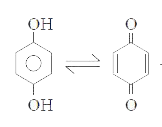Given 2H2O→O2+4H++4e− , E0=−1.23V. Calculate electrode potential at pH = 5.
The correct Answer is:-0.93 V
Step by step video & image solution for Given 2H_(2)O rarr O_2 + 4H^+ + 4e^- , E_0 = -1.23 V. Calculate electrode potential at pH = 5. by Chemistry experts to help you in doubts & scoring excellent marks in Class 12 exams.
Updated on:21/07/2023Topper's Solved these Questions
Similar Questions
Given that, Co3++e−→Co2+E∘=+1.82V
2H2O→O2+4H++4e−,E∘=−1.23V.
Explain why Co3+ is not stable in aqueous solutions.
View SolutionThe potential for the reaction
O2(g)+4H++4e=2H2O(l)
is 1.23 V in 0.1 N acid solution. Calculate the potential of this couple in aqueous solutions having (a) pH = 10 (b) pH = 14
View Solution
Knowledge Check
One ecologically important equilibrium is that between carbonate and hydrogen carbonate ions in natural water. This standard Gibb's energies of formation of CO−23(aq) and HCOΘ3(aq) are −527.8kJmol−1 and −586.8kJmol−1 respectively.
For water,
2H2O(l)+2eΘ→H2(g)+2OHΘ(aq),EΘRP=−0.83V
2H2O→O2+4H++4eΘ,EΘOX=−1.23V
Calculate the potential of a cell of pH=7 in which the cell reaction is-
Na2CO3(aq)+H2O(l)→NaHCO3(aq).+NaOH(aq)A−0.22 voltB+0.193 voltC−0.0135 voltD+0.41 voltOne ecologically important equilibrium is that between carbonate and hydrogen carbonate ions in natural water. This standard Gibb's energies of formation of CO−23(aq) and HCOΘ3(aq) are −527.8kJmol−1 and −586.8kJmol−1 respectively.
For water,
2H2O(l)+2eΘ→H2(g)+2OHΘ(aq),EΘRP=−0.83V
2H2O→O2+4H++4eΘ,EΘOX=−1.23V
The value of pKa for HCOΘ3 (aq) is (approx):A9.3B10.3C8.3D11.3For the half cell,

+2H+2e−.E0=
1.30 V. At pH=2, electrode potential of the given quinhydrone half cell is :A1.36VB1.30VC1.42VD1.20V
50mL of 0.1MCuSO4 solution is electrolysed with a current of 0.965A for a period of 200sec. The reactions at electrodes are:
Cathode: Cu2++2e−→Cu(s)
Anode: 2H2O→O2+4H++4e.
Assuming no change in volume during electrolysis, calculate the molar concentration of Cu2+,H+ and SO2−4 at the end of electrolysis.
View SolutionWhat would be the electrode potential for the given half cell reaction at pH = 5 ?
2H2O→O2+4H++4e−,E∘red=1.23V
(R=8.314Jmol−1K−1Temp=298K, oxygen under std. atm. Pressure of 1 bar )
View SolutionIn acid medium, MnOc−4 is an oxidizing agent.
MnOc−4+8H⊕+5e−→Mn2++4H2O
If H⊕ ion concentration is doubled, electrode potential of the half cell MnOc−4,Mn2+∣Pt will
View SolutionPairs of electrodes and their corresponding standard electrode potentials are given. Arrange the cells constructed by these electrodes in increasing order of emf values
(1) Electrode →A,E∘=−2.92V and Electrode →B,E∘=−2.71V
(2) Electrode →C,E∘=−0.760V and Electrode →D,E∘=−0.44V
(3) Electrode →B,E∘=−2.71 and Electrode →D,E∘=−0.44V
(4) Electrode →A,E2=−2.92V and Electrode →C,E∘=−0.76V
View SolutionPotential for some half cell reactions are given below. On the basis of these mark the correct answer.
(i) H+(aq)+e−→(12)H2(g) E∘cell=0.00V
(ii) 2H2O(l)→O2(g)+4H+(aq)+4e−, Ecell=1.96V
(iii) 2SO2−4(aq)→S2O2−8(aq)+2e−,E∘cell=1.96V
View Solution
